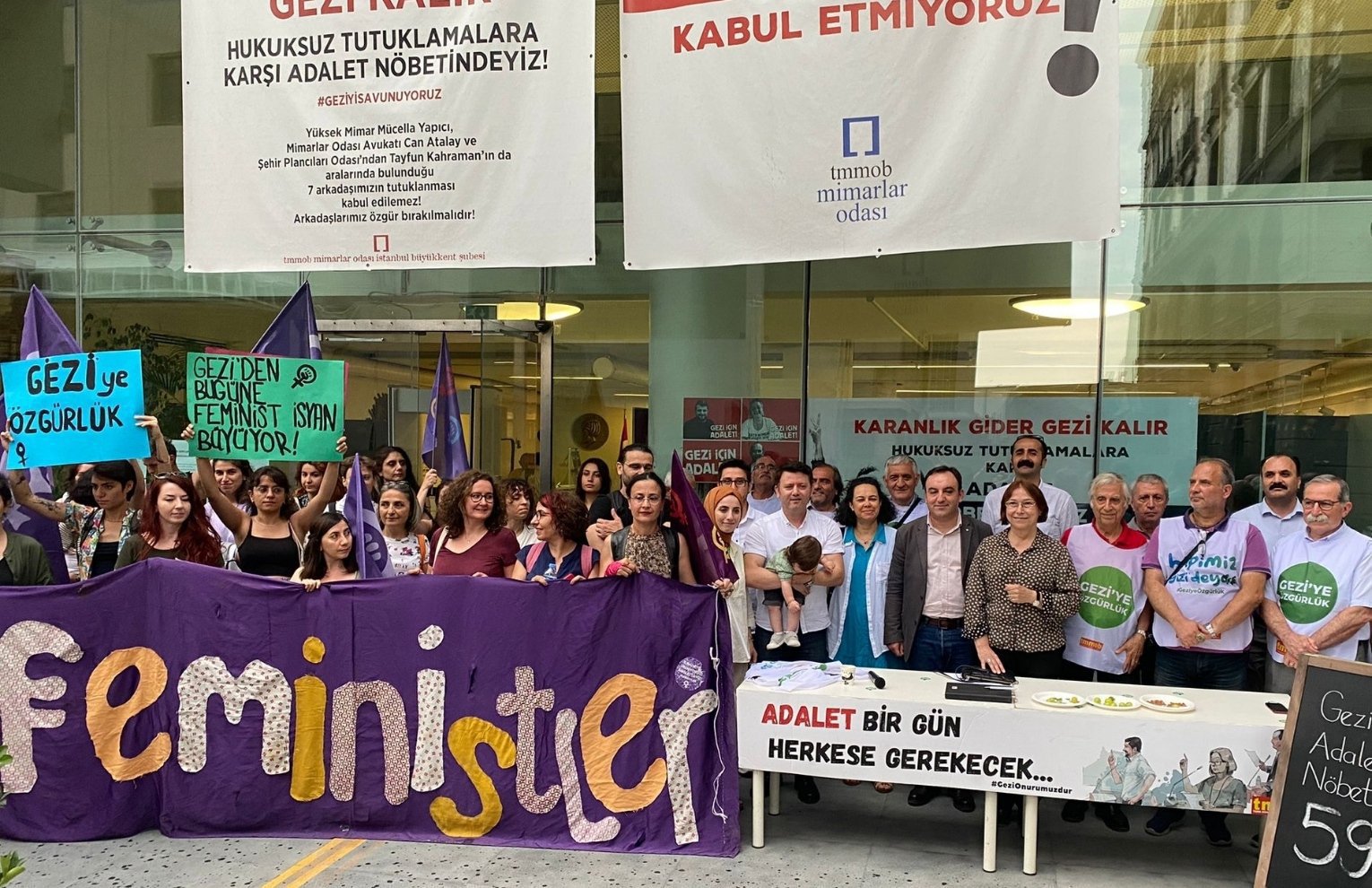Click to read the article in Turkish / Kurdish
Feminists visited the Justice Vigil, launched by the Union of Chambers of Turkish Engineers and Architects (TMMOB), in protest of the Gezi Trial.
On the 59th day of the vigil, which started on April 27, feminists carried placards and banners that read, "We were all in Gezi, we do not accept the unlawful decision and arrests in the Gezi trial", "Darkness goes, Gezi remains", and "We are on Justice Vigil against unlawful arrests", "Everyone will need justice one day", "Feminist revolt grows since Gezi" and "Freedom for Gezi".
| During the second session of the final hearing of the Gezi Trial held on April 25, 2022, the İstanbul 13th Heavy Penal Court gave Osman Kavala an aggravated life sentence for "attempted overthrow", while the other defendants Mücella Yapıcı, Çiğdem Mater, Hakan Altınay, Mine Özerden, Can Atalay, Tayfun Kahraman, Yiğit Ali Ekmekçi were sentenced to 18 years in prison for assisting this crime. |
"We are here to give a voice"
Speaking on behalf of feminists, Feride Eralp said:
"We resisted in Gezi to exist without fear on the streets, in cities, and squares. Now we are here together in the Justice Vigil. We are here to give a voice to our fellow feminists Mücella Yapıcı, Çiğdem Mater, Mine Özerden, all Gezi prisoners, political prisoners in prison, and those who were punished for opposing this government. We will continue to be their voice.
"Today, people are being forced from their neighborhoods such as Fetihtepe and Tokatköy. The Pride Parade and March 8 are banned. While Mücella, Çiğdem, Mine, and all Gezi prisoners are kept behind bars, the murderers walk freely and are rewarded with a sentence reduction due to unjust provocation. We don't accept this. We say: Prevent male violence and discrimination, don't punish those who defend women, their rights, and those who defend their streets and neighborhoods. Together we shout: Long live our feminist struggle."

Painting of Mater, Yapıcı and Özerden
"They are fighting for a livable country"
On the 59th day of the Justice Vigil, the press release was read by Füsun Sümer, the Chair of the İstanbul Branch of Chamber of Civil Engineers.
"We know that Can Atalay, Tayfun Kahraman, and Mücella Yapıcı are in prison today not because they defended Gezi, but because they shouldered the struggle to create a livable country. The concept of justice includes urban justice, as well as the struggle against the usurpation of the right to work. It aims to establish livable life as a whole," she said.
"Our friends must be released"
Sümer continued:
"If the meaning of the Gezi Park resistance was not so widespread, it would not have been so inclusive. Nor would the law have been violated to this extent in order to punish these symbolic names of the resistance.
CLICK - Who are the eight convicts of the Gezi case?
"The Gezi ruling ended discussions on the separation of powers. It took its place in history as a clear example of the lack of judicial independence. This decision is null and void. Our friends must be released. How they do it is up to the judiciary powers. Our demands are humane and conscientious.
"We highly value the Gezi Park resistance, the millions who took to the streets, the young people who lost their lives, and our friends in prison. No power can break this connection. On the 59th day of the Justice Vigil, we convey our love and support to our friends. We believe our voices will linger in the skies above İstanbul until the day the darkness is gone."
CLICK - Message from women prisoners of Gezi: 'It is not only about the eight people'
About Gezi trialThe Gezi trial began again on May 21, 2021 as the court of appeals overturned the verdicts of acquittal given by the local court. Arrested for over 1,200 days, businessperson and rights defender Osman Kavala and 15 other defendants appeared before the judge at the İstanbul 30th Heavy Penal Court in Çağlayan on charge of "attempting to overthrow the government." Here is a brief overview of the judicial process: Who stood trial?Osman Kavala, Mücella Yapıcı, Can Atalay, Tayfun Kahraman, Ali Hakan Altınay, Yiğit Aksakoğlu, Yiğit Ali Ekmekçi, Çiğdem Mater Utku and Mine Özerden, who were acquitted in the first trial; and Can Dündar, Mehmet Ali Alabora, Ayşe Pınar Alabora, Gökçe Tüylüoğlu, Handan Meltem Arıkan, Hanzade Hikmet Germiyanoğlu and İnanç Ekmekçi, whose files were separated, but have been merged again afterwards. Even though he was acquitted in the Gezi trial, Osman Kavala was continued to be kept behind bars in Silivri Prison at the outskirts of İstanbul. Yiğit Aksakoğlu also served 220 days behind bars in the Gezi trial. Who were the aggrieved parties?In the Gezi trial, where rights defenders were acquitted, the members of the 61st term cabinet, which was established in 2011, were referred to as the complainant aggrieved parties in the indictment. On the list of the aggrieved parties were the then PM Recep Tayyip Erdoğan, the then Deputy Prime Ministers Bülent Arınç, Ali Babacan, Beşir Atalay, Bekir Bozdağ, Emrullah İşler and the then Ministers Binali Yıldırım, Fatma Şahin, Egemen Bağış, Nihat Ergün, Faruk Çelik, Erdoğan Bayraktar, Ahmet Davutoğlu, Taner Yıldız, Suat Kılıç, Mehdi Eker, Hayati Yazıcı, Muammer Güler, Cevdet Yılmaz, Ömer Çelik, Mehmet Şimşek, Nabi Avcı, İsmet Yılmaz, Veysel Eroğlu, Mehmet Müezzinoğlu, Zafer Çağlayan and Sadullah Ergin. After founding the Future Party, Ahmet Davutoğlu announced that he withdrew from the files of criminal cases related to the crimes committed against him personally and were not of public nature, especially from the trials for insult, as an aggrieved party. DEVA Party Chair Ali Babacan also said, "I am not a complainant in the Gezi trial, nor am I an intervening party. Thinking that they were aggrieved, the prosecutor wrote the names of all members of the then government one by one. In our judicial system, there is no such thing as withdrawing from the position of an aggrieved party." What were the defendants charged with?In the first 657-page indictment, Gezi was defined as "an insurrection for coup". The defendants were accused of "organizing and funding the protests." They were charged with "attempting to overthrow the government", "damaging property", "damaging places of worship and cemeteries", "violating the Law on Firearms, Knives and Other Tools", "aggravated plunder" and "violating the Law on Protecting Cultural and Natural Assets." In reversing the acquittals, the court of appeals also demanded that a criminal complaint be filed against the defendants on the grounds that they violated the Law no. 2911 on the Meetings and Demonstrations. According to the indictment, 16 defendants separately faced 606 years to 2,970 years in prison. The first trialIn July 2013, 26 people, including Mücella Yapıcı from the Chamber of Architects and Ali Çerkezoğlu from the İstanbul Medical Chamber, were detained. While they were released following their statements, the rights defenders faced a lawsuit for "founding and leading an organization" in March 2014. All defendants were acquitted in the ensuing trial heard by the İstanbul 33th Penal Court of First Instance on April 29, 2015. Afterwards, it was understood that prosecutor Muammer Akkaş was carrying out an investigation against the people who are currently on trial. Akkaş was also the person who gave the instruction to wiretap the rights defenders' phones. However, he was dismissed as part of an investigation into the December 17-25, 2014 operations and fled Turkey. İstanbul Public Prosecutor Yakup Ali Kahveci took over the file after Akkaş. The investigation, which also consisted of the evidence collected by Akkaş, was completed in 2019; the first hearing was held on June 24. Arrested pending trial, Yiğit Aksakoğlu was released at this hearing. A fews days after the second hearing, the Board of Judges and Prosecutors (HSK) changed the court board hearing the case. Accordingly, Galip Mert Perk was assigned as the Presiding Judge and Talip Ergen as a member of the court board. While the HSK did not change the place of duty of senior member Ahmet Tarık Çiftçioğlu, who had ruled in favor of the "continued arrest" of both Osman Kavala and Yiğit Aksakoğlu, the member of the court board who had expressed a dissenting opinion to the related ruling was assigned to another court. Examining the individual application of Osman Kavala, the European Court of Human Rights (ECtHR) pronounced its ruling of right violation on December 10, 2019 and ruled that Osman Kavala should be released immediately. At the final hearing on February 18, 2020, all defendants, except for the ones who were abroad, were acquitted of the offenses charged. Despite this acquittal and the ECtHR judgement, Osman Kavala was arrested again on another charge. Why they stood trial again?Following the acquittals in the Gezi trial, President and Justice and Development Party (AKP) Chair Recep Tayyip Erdoğan spoke at the group meeting of his party. Targeting Kavala, he said, "The person who stirred up Gezi was behind bars. They tried to acquit him with a maneuver." Shortly after this statement was made, the Board of Judges and Prosecutors (HSK) launched an inquiry against the three judges who were the members of the board of the İstanbul 30th Heavy Penal Court. The prosecutor's office also appealed against the verdicts of acquittal. Public Prosecutor Edip Şahiner demanded that the acquittals be reversed. The 3rd Penal Chamber of the İstanbul Regional Court of Justice, the court of appeals, reversed the rulings of acquittal handed down by the local court, the İstanbul 30th Heavy Penal Court, on January 22, 2021. Referring to the charges brought against the defendants in the indictment, the court justified its reversal by indicating that the pieces of evidence such as the defendants' social media posts, press statements and slogans chanted were not considered in handing down the ruling. The second trialThe final hearing of the second trial took place in two sessions on April 23 and April 25, 2022. Osman Kavala, a businessperson and a rights advocate who has been kept in in prison for four and a half years despite an ECtHR verdict, was sentenced to aggravated life imprisonment for "attempting to overthrow the government" while he was acquitted of "espionage." Mücella Yapıcı, Çiğdem Mater, Hakan Altınay, Mine Özerden, Can Atalay, Tayfun Kahraman and Yiğit Ali Ekmekçi were sentenced to 18 years in prison for assisting this crime. Justified RulingThe İstanbul 13th Heavy Penal Court announced its justified ruling regarding the Gezi Trial on June 7. While 84 pages of the 610-page justified ruling included information about the complainants, participants, and defendants, most of them were statements of the defendants and lawyers at the hearings. The court that listed the laws and precedents in its justified ruling, did not accept the data obtained through illegal wiretapping activities during the Fethullahist Terrorist Organization (FETÖ) era as evidence but still included the tapes in its justified ruling. Referring to a decision of the Military Court of Appeals in 1997, the court did not ask for material evidence on the grounds that the purpose of political and military espionage should be evaluated with intent. |
(NÖ/TB/SD)







